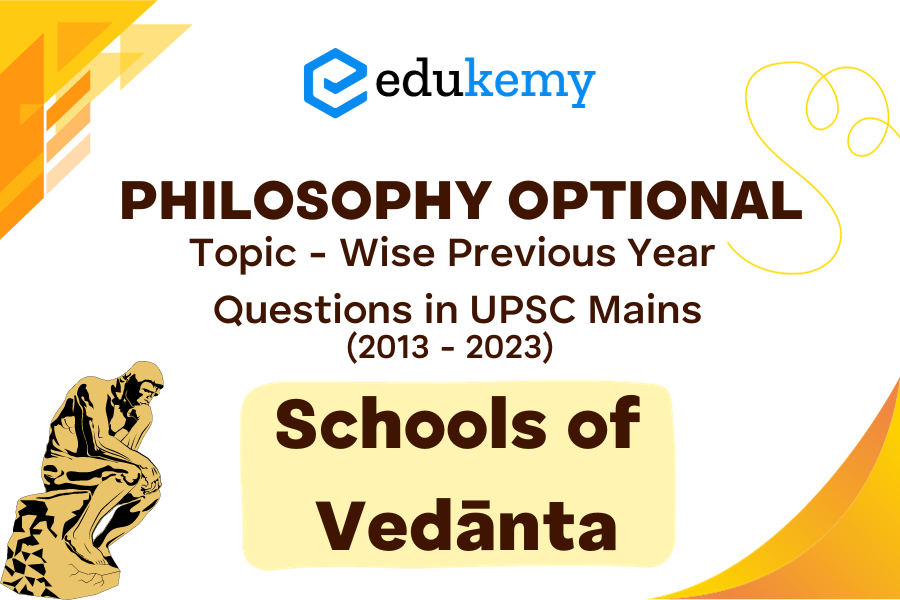
Embarking on the challenging journey of preparing for the UPSC Mains examination can often feel like an arduous task, especially when it comes to choosing an optional subject. Among the myriad choices, philosophy stands out as a subject that not only tests your critical thinking abilities but also delves deep into the intellectual and spiritual dimensions of human thought. In particular, the section on “Schools of Vedānta” has been a recurrent theme in the UPSC philosophy optional paper from 2013 to 2023. As we explore this fascinating realm of Indian philosophy, we’ll delve into the rich tapestry of Vedānta, a profound school of thought that examines the ultimate nature of reality, the self, and the relationship between the two. In this blog series, we’ll take a closer look at the previous year’s questions related to this topic and unravel the intricacies of Vedānta, equipping you with the knowledge and insights needed to excel in the UPSC Mains examination.
The study of Vedānta is a captivating journey through the scriptures and philosophical texts of ancient India, offering profound insights into the nature of existence and the path to self-realization. By delving into previous year questions on this topic, we aim to provide you with a comprehensive understanding of the core concepts, prominent philosophers, and the evolution of Vedānta over the years. We’ll explore the various schools of Vedānta, such as Advaita, Dvaita, and Vishishtadvaita, and analyze the nuanced differences between them. Through this series, we hope to not only aid your preparation for the UPSC Mains but also foster a deeper appreciation for the intellectual and spiritual heritage that is Vedānta. So, let’s embark on this intellectual voyage together and unlock the secrets of Vedānta, one question at a time.
Contents
Schools of Vedānta Philosophy – Previous Year Questions (UPSC CSE Mains History Optional)
1. Distinguish between vivartavada and parinamvada with referenceto causation and explain how in the light of these theories Sankaraand Ramanuja differ on the status of the world. (2017/15)
2. Explain Ramanuja’s conception of God and examine the difficultieshe faced in explaining the relation of God to matter and spirits.(2017/15)
3. Evaluate Sankara’s position on Isvara.(2016/10)
4. Pancavidhbheda.(2015/10)
5. Compare and contrast the notion of Brahman in Sankar andRamanuja.(2015/20)
6. How does nature of Brahman differ in the philosophy of Shankar ,Ramanuja and Madhva ? Discuss critically. (2014/20)
7. Bring out the significance of the concept of adhyasa in Sankara’sphilosophy to develop his metaphysics. (2014/10)
8. Describe the five types of differences (Panchvidbheda). Bring outtheir philosophical significance for Madhva’s theory.(2013/12 ½ )
9. How can Isvara (God) be distinguished from Brahman( Absolute) ?Which of the two concepts are philosophically better ?(2013/12 ½)
10. Distinguish between svarup lakshan and tatastha lakshan ofBrahman after Sankara.(2013/12 ½)
11. Evaluate Ramanuja’s critique of Sankara’s theory of maya.(2013/12 ½)
12. Do you agree with Ramanuja’s view that the nature of Brahman isqualified ? Give reasons . (2012/15)
13. Write a note on Shankara’s Vivartavada and discuss its implications. ( 2012/15)
14. Explain why avidya and maya are considered anirvachniya(indescribable) in advait vada ? (2012/15 )
15. Explain the notion of egoor ahankara and its role in the doctrine ofVedanta.(2012/15)
16. “Both Shamkar and Ramanuja are right in their affirmation, butwrong in their denial.” Critically evaluate. (2010/30)
17. Is Shamkar’s concept of adhyasa logical or psychological? Discuss.(2010/15)
18. How is Ramanuja’s concept of dharmabhutajnana different fromShamkar’s concept of swarupajnana? Explain. (2010/15)
19. Explain Sankara’s view on the status of Jagat and Ramanuja’sresponse to it. (2008/60)
20. State and explain the difference between Saguna and NirgunaBrahman. (2007/60)
21. Examine Shankara’s Mayavada. Short Notes. (2006/20)
22. Discuss the Metaphysics of Acharya Ramanuja. (2006/60)
23. The nature of Brahman, Jiva and Jagat according Madhava. ShortNotes. (2005/20)
24. Elucidate Shankara’s conception of Adhyasa. (2005/60)
25. Why is Ramanuja’s philosophy called Visistadvaita? Discuss fully.(2004/60)
26. Madhava’s conception of moksha. Notes. (2004/20)
27. Ramanuja criticism of Advaita concept of maya. Short Notes.(2003/20)
28. Describe Sankara’s explanation of jiva. Is the justification offer edrational? Explain.(2003/60)
29. Ramanuja’s refutation of Mayavada. Short Notes. (2002/20)
30. Evaluate Sankara’s analysis of moksha in the light of Ramanuja’sarguments. (2001)
FAQs on Schools of Vedānta
Q: What are the Bhakti Schools of Vedanta?
A: The Bhakti Schools of Vedanta are a subset of Vedantic philosophy that emphasize devotion (bhakti) as the primary means to achieve spiritual realization and union with the divine. These schools focus on personal deity worship and surrender as the key to attaining moksha (liberation).
Q: Which are the prominent Bhakti Schools of Vedanta?
A: Some of the prominent Bhakti Schools of Vedanta include the Vishishtadvaita school founded by Ramanuja, the Dvaita school established by Madhva, and the Achintya Bheda Abheda school propagated by Chaitanya Mahaprabhu. These schools have different interpretations of the relationship between the individual soul and the divine.
Q: How do these schools differ in their focus?
A: These schools differ in their primary areas of focus. For instance, Nyaya and Vaisheshika concentrate on logic and atomism, Samkhya and Yoga emphasize metaphysical and psychological aspects, Mimamsa delves into rituals and duties, and Vedanta explores the ultimate reality and self-realization.
Q: Which school of Vedic philosophy is considered the most influential?
A: Vedanta is often considered the most influential among the Six Schools. It addresses profound questions about the nature of the self, ultimate reality (Brahman), and the relationship between the two. It has various sub-schools like Advaita, Vishishtadvaita, and Dvaita.
In case you still have your doubts, contact us on 9811333901.
For UPSC Prelims Resources, Click here
For Daily Updates and Study Material:
Join our Telegram Channel – Edukemy for IAS
- 1. Learn through Videos – here
- 2. Be Exam Ready by Practicing Daily MCQs – here
- 3. Daily Newsletter – Get all your Current Affairs Covered – here
- 4. Mains Answer Writing Practice – here

